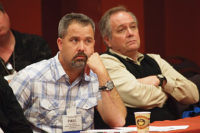More than 150 HVACR professionals explored the topic of building performance, the transition to home performance contracting, and more at Air Conditioning Contractors of America’s (ACCA) inaugural Building Performance Forum, Oct. 9-10, in Austin, Texas.
Systematic Solutions
The forum presented a dozen contractor-led learning lab sessions, focusing on introductory and advanced topics.
Nate Kredich, vice president for residential market development, U.S. Green Building Council (USGBC), Washington D.C., opened the conference, sharing how building performance has gained national prominence.
“From 1999 to 2006, Americans built 2 million new homes each year. That’s 2 million opportunities where we can encourage better energy decisions,” he said. “As these homes grow older, it provides further opportunity. This extended replacement boom is coming, and it’s critically important that we offer green, energy-efficient solutions on behalf of the residents and the environment.”
Ellis Guiles, vice president, TAG Mechanical Systems, Syracuse, N.Y., said home performance opportunities are widely available and ready for the taking.
“Outsiders — or people who know little or nothing about indoor environments but carry near-worthless ‘certifications’ attesting nothing more than that they spent a few days in a class — are seizing on the opportunity created by poor building systems. Using government rules and utility mandates, they are stealing customers and setting themselves up to control the whole building performance sector. They want you to work for them,” said Guiles, chairman of ACCA’s Building Performance Council. “The time is now for the HVAC industry to realize its full potential. Only we have the expertise, skills, customer relationships, and marketing savvy to turn ‘building performance’ into a true market-driven business and not some government-funded boondoggle.”
Transitioning to Home Performance
Attending contractors came asking, “So, how is it done, and how can I make money doing it?”
Michelle Knaszak, director of training and operations, GreenHomes America, Canonsburg, Pa., said you have to learn to crawl before you run a marathon.
“It’s very important that you do your research before jumping in with both feet,” said Knaszak, who has 20-plus years of weatherization experience. “There are a ton of resources out there. Do your homework and network, network, network.”
The logical first action step is to examine attic insulation and air sealing, she said.
“It’s unbelievable how much more comfortable — and how much happier — a customer will be when you combine mechanicals with shell work,” she said. “On a typical service call, you’re already in the attic or basement examining the distribution system. And, once you’re trained in home performance, you can address the insulation and air sealing issues as well. This can be done efficiently, easily, and takes very little time. Suddenly, by recommending sealing and insulation, your $5,500 ticket has increased to $10,000.”
Chris McKinney, residential service manager, Entek Corp., Longview, Wash., agreed that aspiring contractors should start slow and build accordingly.
“Research shows that a distribution system has to be tackled first. Then move on to the other steps such as insulation, doors, windows,” he said. “When I was just getting started, I read everything I could get my hands on dealing with building science. I then attended building science classes, gained National Comfort Institute and Building Performance Institute certifications.
“You have to take the responsibility of becoming the expert; you have to have that thirst for knowledge. These are all key drivers to success.”
Many of the presenters shared that training is key, and insisted that technicians attend courses and earn certifications before tackling services they’re unfamiliar with. However, in the meantime, several experts suggested subcontracting as a temporary solution.
“Subcontracting offers a solution, but it’s not an excuse to leave the scene; you still have to control the process,” said Hal Smith, co-owner, Halco, Phelps, N.Y. “You have to be the general contractor who sets all the expectations, does the testing, and provides quality assurance. Ultimately, it’s your name on the bill.”
A Fantastic Forum
“The 2012 ACCA Building Performance Forum was very eye-opening,” said Mike Tucker, owner, Tucker’s Air Conditioning & Heating, Gaithersburg, Md. “There was a lot of great information in a short timeframe. I believe this is an important step for my company and will help me achieve my company and personal goals.”
“I really liked the way the event was structured with tracks for beginners and more experienced contractors,” said Keith Paton, Ivey Mechanical, Kosciusko, Miss. “The presenters were willing to share the good and the bad stories about their experience and it gave a lot of reassurance that contractors can succeed. It was great to see how to get down the road to be successful.”
Rob Minnick, CEO/president, Minnick’s Inc., Laurel, Md., said of the forum, “It brought together so many contractors that were willing to ask questions and pick my brain for ideas. The networking was awesome, and I’m really looking forward to doing it again next year.”
Publication date: 12/3/2012











